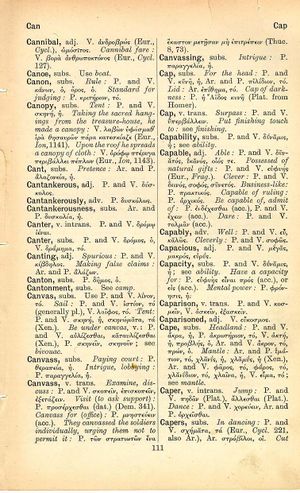canon: Difference between revisions
μελετᾶν οὖν χρὴ τὰ ποιοῦντα τὴν εὐδαιμονίαν, εἴπερ παρούσης μὲν αὐτῆς πάντα ἔχομεν, ἀπούσης δὲ πάντα πράττομεν εἰς τὸ ταύτην ἔχειν → one must practice the things which produce happiness, since if that is present we have everything and if it is absent we do everything in order to have it | so we must exercise ourselves in the things which bring happiness, since, if that be present, we have everything, and, if that be absent, all our actions are directed toward attaining it
(1) |
m (Text replacement - "(|thumb)\n(\|link=)" to "$1$2") |
||
| Line 1: | Line 1: | ||
{{Woodhouse1 | {{Woodhouse1 | ||
|Text=[[File:woodhouse_111.jpg|thumb | |Text=[[File:woodhouse_111.jpg|thumb|link={{filepath:woodhouse_111.jpg}}]]'''subs.''' | ||
|link={{filepath:woodhouse_111.jpg}}]]'''subs.''' | |||
<b class="b2">Rule</b>: P. and V. κάνων, ὁ, [[ὅρος]], ὁ. | <b class="b2">Rule</b>: P. and V. κάνων, ὁ, [[ὅρος]], ὁ. | ||
Revision as of 17:06, 18 May 2020
English > Greek (Woodhouse)
subs.
Rule: P. and V. κάνων, ὁ, ὅρος, ὁ.
Standard for judging: P. κριτήριον, τό.
Latin > English (Lewis & Short)
cănon: ŏnis, m. (acc. canona, Plin. 34, 8, 19, § 55;
I acc. plur. canonas, Aus. Ep. 136; in Cic. Fam. 16, 17, 1, used as a Greek word), = κανών κάννα, κάνη, a reed, cane.
I A marking or measuring line; hence, a rule, canon, model (cf. Lidd. and Scott, under κανών).—
II Esp.
A A wooden channel in hydraulic instruments, Vitr. 10, 13 Rod.—
B Under the emperors, an annual tribute, established by law, in grain, gold, silver, clothing, etc., Spart. Sev. 8; Lampr. Elag. 27.—
C In eccl. Lat., a catalogue of sacred writings, as admitted by the rule, the Canon, Aug. Doctr. Christ. 2, 8; Hier. Prol. Gal. Aug. Civ. 17, 24; 18, 38; cf. Isid. Orig. 6, 15 and 16.—
D Also in late Lat., from their shape, in plur.: cănŏnes, um, cannon: et illic figere gunnas suas, quas Galli canones vocant, quibus validius villam infestare posset, Thom. Walsingham in Henry V. p. 398.
Latin > French (Gaffiot 2016)
cănōn, ŏnis, m. (κανών), loi, règle, mesure : Plin. 34, 55 || tuyau de bois dans une machine hydraulique : Vitr. Arch. 10, 13 || contribution, redevance annuelle sur l’or, l’argent, le grain : Spart. Sev. 8 || ensemble des livres sacrés reconnus par l’Église comme d’inspiration divine : Eccl.
Latin > German (Georges)
canōn, onis, Akk. ona, m. (κανών), I) die Regel, Norm, Richtschnur, Plin. u. Auson. – II) insbes.: A) die Kanzelle einer Wasserorgel (ein Kanal von Brettern, der über der Windlade für jede clavis angebracht ist), Vitr. 10, 10, 3. – B) die jährliche festgesetzte Abgabe (an Getreide, Gold, Silber, Kleidern usw.) während der Kaiserzeit, die ständige Abgabe, Normalabgabe, der Kanon, Spart. Sev. 8, 4. Aurel. bei Vopisc. Firm. 5, 4. Ps. Ascan. Cic. II. Verr. 2, 5. Cod. Theod. 11, 14, 2: c. frumentarius, Lampr. Heliog. 27, 7. – C) das Verzeichnis der Bücher des Alten u. Neuen Testaments, die als göttliche Offenbarung galten u. die inspirierte heilige Schrift bildeten (im Ggstz. zu den profanen oder apokryphischen), der Kanon, Augustin. de civ. dei 15, 23 u. 18, 38. Iulian. epit. nov. 115. § 430 u. 447. Isid. 6, 15 u. 16: c. ecclesiasticus, Augustin. ep. 64, 3: chronici canones, Hieron. vir. ill. 81: evangelici canones, Hieron. vir. ill. 55.

